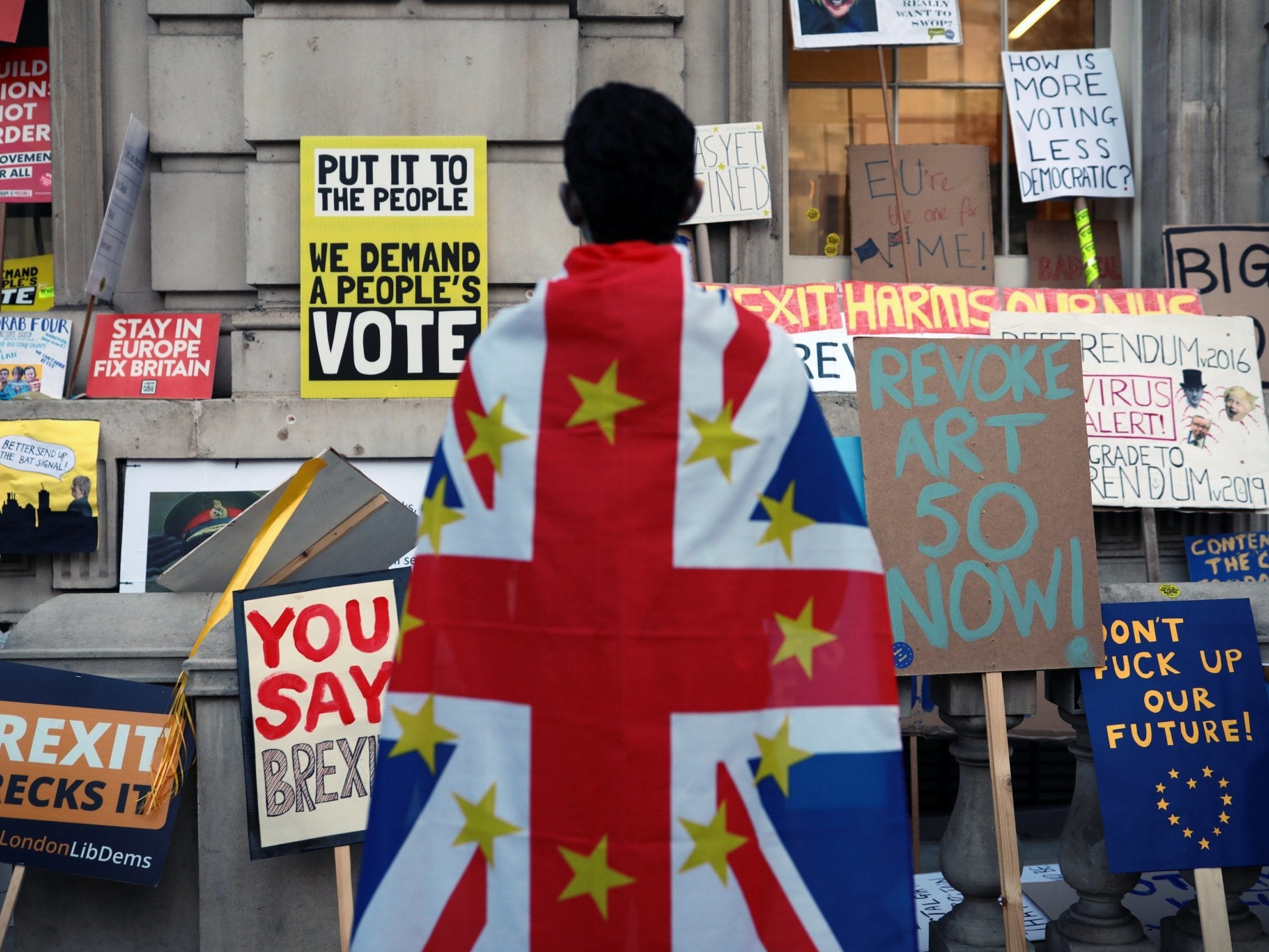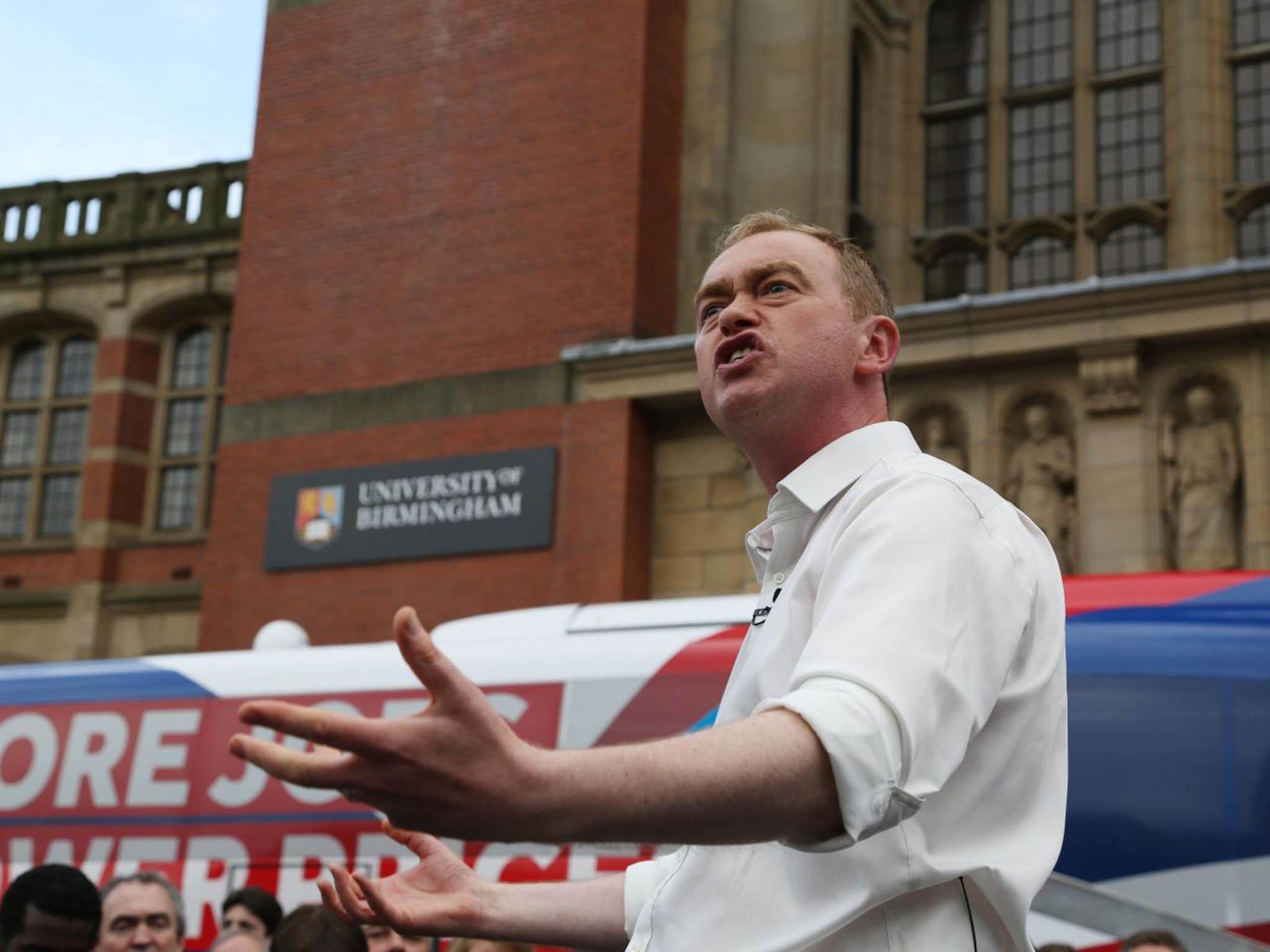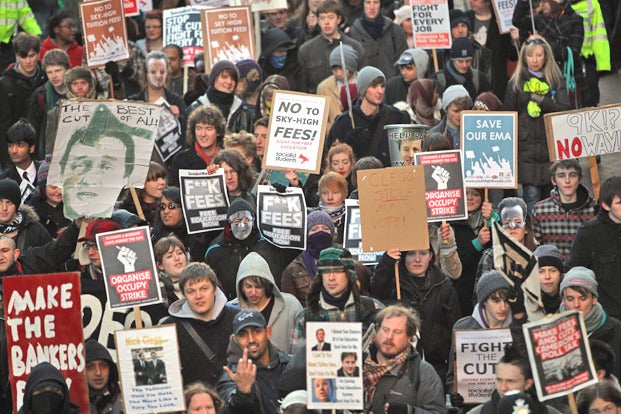Brexit and austerity: a toxic mix that has decimated the life chances of a whole generation
In this dispatch from Brexit Britain, Patrick Cockburn finds young people in Birmingham feel close to the edge


Birmingham is one of the youngest cities in Europe, with almost 40 per cent of its population under the age of 25. As in the rest of Britain, the younger generation believe they are facing greater problems and anxieties than their parents and grandparents.
“I think there is a slight resentment of older people in general, though not on an individual basis,” says Chris Taylor, 29, an accommodation manager living in south Birmingham. “No one hates their nan, but younger people object to the fact that everyone’s nan’s financial interests are very well protected, while other groups have had the hammer [brought down on them].”
The definition of “the younger generation” as a group with the same collective interests has changed radically over the past 40 years. People in their thirties and forties frequently have more in common today with those in their twenties, and even younger, than they do with older age groups when it comes to high rents, insecure employment – and Brexit.
“The stress on younger people is greater than it was before,” says Charlie Mower, 20, a second-year student studying philosophy and politics at Birmingham University. He says it is as if the drawbridge between the generations has been pulled up, leaving the young feeling they have been left outside. “There is uncertainty about housing and jobs, and the teachers themselves are subject to the same uncertainties,” he adds.
Some 80,000 students are studying at universities in Birmingham, which helps explain the low average age. Many say tuition fees are a burden – but less so than the ever-present concern about how to pay the weekly £80-£110 rent for a single room in shared accommodation.
“There are multiple stresses, which include rent, tuition fees, future job prospects and worry about university work itself,” says Mower. “You might get a loan that covers your living costs but not your rent.” This means finding a part-time job, usually in retail or hospitality at the minimum wage or just above. Or, for the better off, looking to their parents for a subsidy.
The assumption that all students are left wing is not true, certainly not in Birmingham compared to Manchester or Sussex
There are many more people undertaking higher education than ever before, with over 27 per cent of 18-year-olds in England seeking qualifications after A-levels or their equivalent. In 1992 there were 984,000 students aged 18-24 in full-time higher education; by 2016 the number had risen to 1.87 million. This is good news for those who can take advantage of the greater opportunities, but it means that being a university graduate has lost its scarcity value compared to a quarter century ago.
Michael Douglas, 22, a second year student from Wales studying geography and history at Birmingham University, explains how he sees things changing for students compared to their elders’ experience: “They didn’t have to pay [at that time] for student loans and there were more jobs available.” The benefits of higher education have, he believes, been seriously diluted. “Back then, it was ‘get qualifications, get job’, but I don’t think it works that way anymore,” he concludes.
This gap between young and old increasingly shapes the political, social and economic terrain in Britain. It was a widely-publicised feature of the EU referendum in 2016 when age and qualifications were the key factors deciding how people voted, according to a study by YouGov. Under-25s were more than twice as likely to vote to remain in the EU – by a margin of 71 per cent to 29 per cent – than over-65s who voted to leave by 64 per cent to 36 per cent.
The other crucial determinant of whether voters wanted to leave or remain in the EU was educational levels. Some 68 per cent of those with a university education voted to remain and 70 per cent of those with only a GCSE or lower qualification voted to leave. Those in between, who had A-level qualifications, were evenly split on the issue. Of course, wealth and poverty determine to a considerable extent a child’s chances to attend good schools (private or state) and to go on to university, so the referendum reflected – and probably exacerbated – existing social and economic divisions.
The political gap has grown even wider since the 2016 vote, according to a report called Generation Why, based on a poll of 10,000 people by Hanbury Strategy for Onward, a centre-right think tank, and published in April. It concludes that “younger and older voters have always been politically different, but never by this much”.
The “tipping point” age when voters become more likely to vote Conservative than Labour has risen from 47 years old at the time of the general election in 2017 to 51 today. No less than 83 per cent of Conservative voters are over 45, and just 4 per cent of Conservative voters are aged under 25. Labour support is better balanced between the generations, with 53 per cent of its voters over 45 and 47 per cent under that age.

Birmingham is one of the cities in the UK and western Europe that has coped best with globalisation and deindustrialisation, which shattered the local economy in the late 1970s and 1980s.
A central feature of its regeneration was the expansion of universities in the city: Birmingham University alone has 30,000 students and more than 7,000 staff; Birmingham City University has 24,000 students; and Aston University 10,000. The advantages of this are self-evident but the success of universities and financial centres in Birmingham give an exaggerated impression of the degree of change in the city as a whole, and the extent to which it benefits everybody.
In practice, the inner city has been transformed for the better – the streets filled with restaurants and the skyline crowded with cranes. But the outer ring beyond the city centre is largely still made up of white working-class districts, just as in the northeast of England, that have never really recovered from the collapse of low and semi-skilled employment, mostly in the automotive industries, 40 years ago.
The impact of university expansion is more nuanced than is often imagined. What’s more, universities are not necessarily hives of political radicalism, as is sometimes supposed. Mower, an activist on the left of the Labour Party, says his fellow students “don’t talk very much about Brexit and, when they do, it is mostly a passing reference: they talk more about rent or how much money they have in the bank”.
He says they do talk about, and hugely resent, tuition fees, but he adds that fees are something “you panic about before you go to university and after you leave, but not necessarily when you are there”. This is because there are so many other competing and more immediate problems to be faced, such as paying rent and pressure about academic work.
Politicisation is greater than before the referendum, but Mower says “the assumption that all students are left wing is not true, certainly not in Birmingham compared to Manchester or Sussex”.
Labour grassroots movement Momentum is strong in the city but not in the university. As for Brexit, Mower believes few students are attracted by extreme Leave or extreme Remain positions, but the political impact of the great numbers of students in Birmingham is less than might be supposed because, as in other large university cities, they form a distinct community separate from the rest of the population. “Students have the weird feeling that if something isn’t happening inside the university then it doesn’t exist at all,” he says.
Douglas, two years older than Mower and also at Birmingham University, says: “I voted to leave – for me it was the whole economic aspect of the thing, and I felt that the EU was a bit undemocratic.” He believes new trade deals with America, China, India, Brazil and Australia will produce higher growth and that the EU will “need us as much as we need them”.
No deal might be bad initially, but he believes Britain would be OK once it had done trade deals elsewhere in the world. He does not care much about immigration because he thinks that if immigrants do not come from the EU they will come from elsewhere and are, in any case, good for the economy. Student life is not that easy for him or for others.
“Coming from a poor background,” says Douglas, “I personally wouldn’t be able to go to university if I hadn’t worked when I was younger and saved up money. Because although we get loans and stuff, it isn’t enough to live on. The loan barely gets you by. I got a job to maintain myself.”
He believes the older generation underestimate how much young people understand politics. He used to be against the voting age being lowered to 16 because “they don’t have the full picture of things”, but he has changed his mind because he sees people of this age reading and researching news. He is more impressed than Mower by the politicisation of the young, saying: “because politics is so important to young people these days, the older generation possibly see us as naive, but maybe we’re too aggressive in pushing our views.”
Chris Taylor moved to Birmingham from Coventry three-and-a-half years ago because his girlfriend, now his fiancée, got a job there. He likes it and says the city has got everything one could want. As to why the city voted marginally in favour of leaving the EU (by 50.4 per cent to 49.6 per cent), he says it was a mix of deprivation and opposition to immigration.
“I live in Chelmsley Wood, which is relatively deprived compared to the surrounding area and is a majority white poorer area. They complain about immigration but don’t live with it – classic Leave voter isn’t it?”
He is adamantly in favour of Britain staying in the EU, adding: “I voted for Remain and actively campaigned for Remain, which is the first campaigning I’ve ever done. It was the sensible thing to do. The arguments for leaving were pretty much without merit. The arguments that annoyed me the most were the arguments about the greater economic opportunities outside the European Union, which is categorically not true.”
He does not blame Theresa May for mishandling the negotiations with the EU, in which he believes she did as well as anybody could have done. But he does dislike her for the way, as home secretary, she dealt with international students, with whom his job brings him into constant contact.

“I objected strongly to their mistreatment,” he says. “They still have to pay astonishingly high visa processing fees and the Home Office is ruthlessly profiteering off them, which is shocking.”
He is alarmed by the sheer toxicity and venom of political debate surrounding Brexit, which he suspects is an overspill of the confrontational approach in US politics in recent years. One can see that, he says, in “the kind of vitriol directed at Corbyn and McDonnell; and McDonnell with his comments about never being friends with a Tory”.
Despite this, Taylor describes himself as an optimist. “I am not sure that young people have it that bad in the West Midlands,” he says, pointing to some areas in the city which have “comparatively cheap housing, which is usually the biggest thing for young people”. Even with Brexit, he believes the economy will “get better, it’s just going to get better more slowly”.
The people at the bottom in the Blair years were still able to put food on the table because of tax credits, but they can no longer do that
But Alex Aitken, 25, the youngest councillor (Labour) on Birmingham Council, has a much bleaker view of the prospects for the young in the city. This is probably because he deals with more significantly impoverished people than Taylor. Representing a largely white working-class ward, he is more conscious of the ongoing impact of austerity in the post-Blair years than of the potential downside or upsides of Brexit.
“I was born and bred in Birmingham with a very working-class, single-parent background,” he says. His mother worked double shifts and the family was just able to get by, despite her falling ill and her grim experience of dealing with the Department for Work and Pensions “to get money just to survive”.
He wanted to become a teacher, he says, “but when I was working part time at Morrisons, I bumped into an old English teacher who said ‘please, please, please don’t become a teacher’ because she said it wasn’t the job she fell in love with 20 years ago because of all the funds being taken out of it.” He discovered all the things he had thought were normal in schools when he was growing up, such as art, were being cut back or had disappeared.
As a councillor, Aitken has seen Birmingham’s budget slashed by £750m since 2010. He says: “Cuts just get passed down, so the government makes the cuts, so the local authority makes the cuts, so the schools make the cuts and families then have to make cuts because they have to provide pens and pencils and toilet paper [for the schools].”
The impact of cuts in school budgets, youth services, Sure Start centres and support for poor parents is not just on children while they are in school.
“I think in the outer city, there’s a big issue with crime,” he says. “There’s a lot of young people getting involved with crime, and when I say young people I don’t mean 18 to 24, I mean 10 to 15-year-olds – and that’s because of an amalgamation of things. You only have to look at the amount of police on our streets compared to eight years ago, and obviously that is a huge, huge factor.
“I was at a meeting with my local police team last week, and for the whole of the ward we have three PCSOs [police community support officers] and one [regular] police officer – and that is the hotspot in the constituency for crime. They work split shifts, so it’s very rare that there’s more than one of them working at a time. They can only be in one place, so lots of people are scared to go down to the shops after dark because of the gangs of kids.”
This social reality for much of the population is often unmentioned during inaccessible Brexit debates about “backstops”, the single market and various forms of customs union. It is conventional wisdom that anger about an unacceptable status quo for young and old alike fuelled the decision to leave the EU, but nothing much has improved for most Leave voters since the referendum almost three years ago.
Aitken, an unenthusiastic Remainer, sees austerity putting unsustainable additional pressure on deprived parents and children, which is already more of a burden than any future threat posed by Brexit. “The people at the bottom in the Blair years were still able to put food on the table because of tax credits, but they can no longer do that,” he says.
“People that you would call the lower middle class or the upper working class are getting to that stage too. Families I know where both parents work are still really struggling. Under the last government, if something went wrong in your life there was always support there for you and you could get back on top.”
But today, if somebody has to leave their job because of illness, a sick child or a family member dying, they often find the necessary state support has disappeared and, according to Aitken, “it’s almost impossible to get back to where you were”.
The age of insecurity is affecting everybody, young and old, but the young are more vulnerable to its effects.
Join our commenting forum
Join thought-provoking conversations, follow other Independent readers and see their replies
Comments